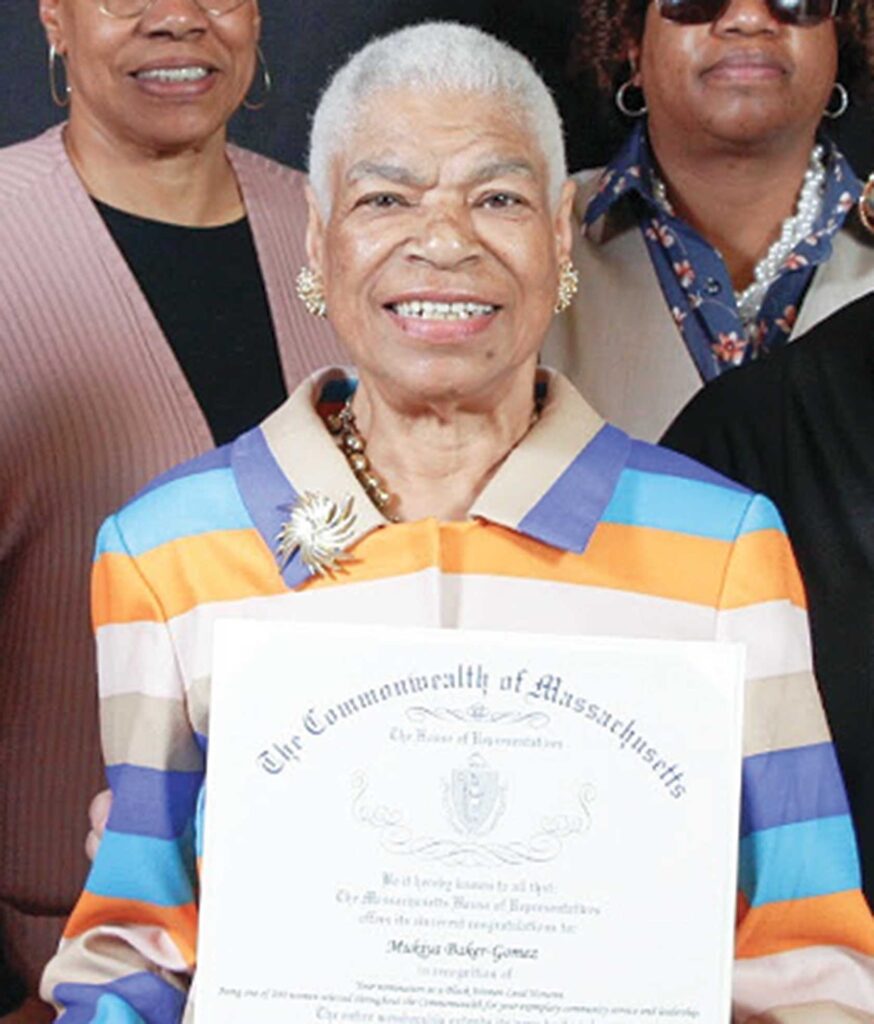Mukiya Baker-Gomez, community leader, 74
A tireless advocate for the Black community in Boston

When Mukiya Baker-Gomez put her effort behind an endeavor, she saw to it that it would get done. For much of last week, she was helping organize a Saturday town hall meeting. Thursday, she was in Mattapan Square handing out flyers. Friday, she ordered doughnuts and coffee for the event, making sure they would be delivered.
But when Saturday came, the doughnuts showed up, but Baker-Gomez didn’t. At 74, she was felled by a heart attack, bringing to a sudden end a life marked by service to her community.
Politics and community empowerment were driving forces in her professional life. She headed State Office of Minority and Women Business Assistance (SOMWBA) in the 1980s and worked on countless electoral campaigns, helping politicians including Mel King, Chuck Turner, Ayanna Pressley, Gloria Fox and Dianne Wilkerson win office.
“She was committed to the community and making sure we got what was due to us,” said her sister, Dadizi Baker.
“My heart is really broken,” said former City Councilor Charles Yancey. “She is one of the unsung heroes of the Black community.”
Born at Boston City Hospital in 1948, Baker-Gomez grew up in a home at the corner of Bainbridge and Kensington Streets, an area now occupied by Martin Luther King Jr. Boulevard and Malcolm X Park. She graduated from Jamaica Plain High School and attended Lesley University.
Following in the footsteps of her aunt, a Republican activist during the civil rights era when that party was favored by Blacks, Baker-Gomez and her siblings were inculcated with the spirit of political activism, each registered to vote after their 18th birthday.
“We have all been voting since then,” said Dadizi Baker.
Priscilla Flint, who met Baker-Gomez while working on the campaign of former City Councilor Gareth Saunders, said she learned politics through working with her.
“Mukiya was smart as a whip,” she said. “All you had to do was ask her. She could tell you how to do anything.”
Dadizi Baker echoed these sentiments.
“In our family, Mukiya was the political guru,” Baker said. “She was the go-to person. She was the person who got people in the community jobs. If you asked her a question and she didn’t know the answer, she could tell you where to find it.”
Throughout her life, Baker-Gomez weaved in and out of state government, working for elected officials and volunteering with community-based organizations. During the 1970s, she worked for and volunteered with the Black United Front, a grassroots organization that worked in the Black community in Boston. She worked with the Contractors Association of Boston — a consortium of Black construction firms — and the Opportunities Industrialization Center, a program that trained community residents for high-tech jobs, and with the state’s Department of Youth Services.
At SOMWBA, where she worked from 1985 to 1991, Baker-Gomez was responsible for certifying minority and women business enterprises and helping them secure contracts with state government.
She reprised that role during the administration of Gov. Deval Patrick when, working with the state’s Division of Capital Asset Management and Maintenance, she oversaw compliance for the construction of the UMass Boston Science Center.
“She was very instrumental in ensuring that contractors of color had a shot at construction on the UMass project,” Yancey said. “She was very dogged, effective and demanding.”
Baker-Gomez worked on two of Yancey’s campaigns for reelection. She served as chief of staff for former state Rep. Gloria Fox and as a legislative aide to Wilkerson.
Through most of her life, Baker-Gomez seemed content to work quietly behind the scenes, helping others assume leadership positions in government and community. At times, however, she would directly confront those in power, whether it was a ward committee chair unwilling to share power or a state official whom she felt was slow to respond to the needs of the community.
“She was willing to challenge the status quo with tenacity,” Yancey said.
In May, Baker-Gomez was recognized as one of the 200 most influential Black women in Boston in the Black Women Lead project. Her image will be among those that adorn banners along Blue Hill Avenue as part of that project.
Underlying her work in various roles at the city and state level was a deep concern for the welfare of her community, said retired teacher and veteran political activist Bob Marshall.
“She wanted to work for her community,” he said. “She wanted to make the community and all of Boston a better place.”
Baker-Gomez is survived by her husband, Kevin Gomez; their children, Talisha and Kenyatta; siblings Dadizi Bker, Gregory Baker, Karyn Baker-Harris, Charles Baker, Constance Curry and Pamela Keel; and four grandchildren.
A wake will be held Wednesday, June 21, at the Twelfth Baptist Church from 4 to 8 p.m.







